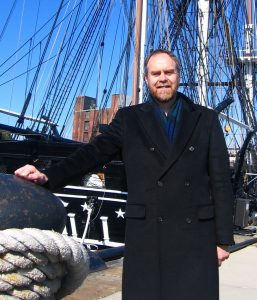Andrew Lambert is Laughton Professor of Naval History in the Department of War Studies at King’s College, London. His books include: The Crimean War: British Grand Strategy against Russia 1853-1856. Manchester 1990, ‘The Foundations of Naval History’: Sir John Laughton, the Royal Navy and the Historical Profession. London 1997, Nelson: Britannia’s God of War. London 2004, Admirals. London 2008, Franklin: Tragic hero of Polar Navigation. London 2009 and The Challenge: Britain versus America in the Naval War of 1812, London 2012, winner of Anderson Medal of the Society for Nautical Research. His new book, Crusoe’s Island: A Rich and Curious History of Pirates, Castaways and Madness was this past week published by Faber & Faber
 Although I never planned to become a naval historian, it may seem inevitable on reflection. My father served in the Royal Navy during the Korean War, and gave lifelong voluntary service to the naval veteran’s organisation. I grew up in a home where the Navy mattered and, like Nelson, I am a Norfolk man. I read my way through entire libraries of naval history as a boy, and would be reading them still, whatever course my life had taken.
Although I never planned to become a naval historian, it may seem inevitable on reflection. My father served in the Royal Navy during the Korean War, and gave lifelong voluntary service to the naval veteran’s organisation. I grew up in a home where the Navy mattered and, like Nelson, I am a Norfolk man. I read my way through entire libraries of naval history as a boy, and would be reading them still, whatever course my life had taken.
When I went to University in the mid-1970s there was no place for naval history, both the subject and the scholars seemed to be fading into a post-imperial past, replaced by a new world view, where the European Economic Community and NATO were the twin pillars of future policy. 1805 and all that seemed passė, ideas brilliantly expressed in Paul Kennedy’s Rise and Fall of British Naval Mastery of 1976. I read that book, as a second year law student, and Paul advised me to pursue an MA in War Studies, at King’s College London. I completed a Ph.D on the Crimean War in the Baltic – a suitably obscure place to begin – while the Falklands Conflict raged. Suddenly naval history did not seem quite so irrelevant. There were still no jobs, so I taught international history, contemporary strategy, Marxist economics and Army history at Sandhurst. My thesis turned into a book on British Grand Strategy against Russia, which appeared in 1990, just as its’ contemporary relevance evaporated in the chaotic collapse of the Soviet Union. Fortunately War Studies hired me to teach history on a new undergraduate programme in 1991. Since then I have tried to develop my subject. It is no accident that naval history thrives in the multidisciplinary War Studies Department, which addresses problems, rather than disciplinary agendas.
Modern naval history was created to educate professional naval officers in the 1880s, and most academic practitioners either teach Navies, or have taught them. Navies privilege relevance and practical insight above academic priorities. Working with service educators and academic colleagues requires considerable flexibility, but the intellectual exchange can be hugely rewarding. If you study an organisation as a historian it is always worthwhile getting to know the modern incarnation. While the technology of securing the seas may have changed, the political mission and the professionalism have not.
The global reach of naval history has provided research opportunities beyond the library and the archives. Working on television documentaries I’ve sailed along the Barrier Reef in the wake of Captain Cook, scoured high Arctic for Sir John Franklin’s cannibal expedition, and more recently lived on Juan Fernandez Island, a tiny green speck in the South Pacific that will be forever English. The appetite for naval history in Britain reflects the fact that the sea connects us to our mythic past, the Armada, Trafalgar, and the great battles of the Second World War, the Atlantic and Arctic convoys. The sea, as Shakespeare stressed, means something special to the English, and it always will. It is a privilege to be a naval historian in an era that has seen such a seismic shift in national attitudes. A sense of the sea is a critical component of British identity, but there remains much work to be done before the subject achieves a commensurate academic profile.


Hi
I’d be interested in your views on how we can engage with the public on a more productive level, to ensure future interest in our ever lengthening naval history remains or better still thrives?
Thrives in the sense of access, communication, knowledge and development without the recourse to high academia!